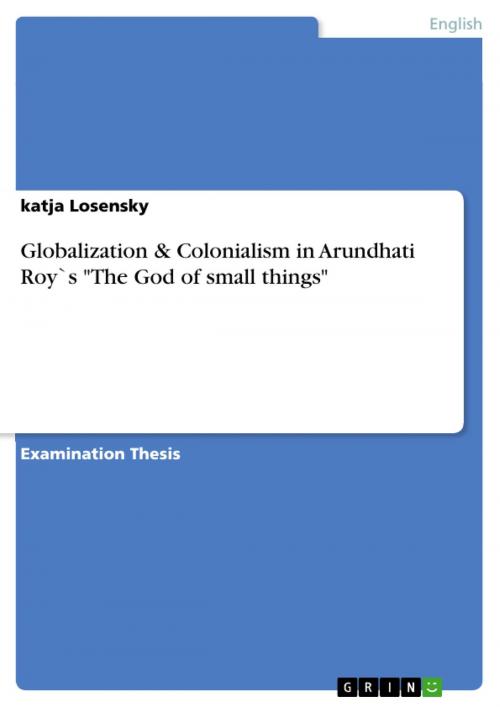Globalization & Colonialism in Arundhati Roy`s 'The God of small things'
Fiction & Literature, Literary Theory & Criticism, British| Author: | katja Losensky | ISBN: | 9783640357246 |
| Publisher: | GRIN Publishing | Publication: | June 25, 2009 |
| Imprint: | GRIN Publishing | Language: | English |
| Author: | katja Losensky |
| ISBN: | 9783640357246 |
| Publisher: | GRIN Publishing |
| Publication: | June 25, 2009 |
| Imprint: | GRIN Publishing |
| Language: | English |
Examination Thesis from the year 2008 in the subject English Language and Literature Studies - Literature, grade: 2,3, Humboldt-University of Berlin, course: Cross-cultural representations of India, language: English, abstract: In this essay I want to show how globalization and colonialism are phenomenons which cannot be looked at separately when speaking about India`s history and present. Roy`s book does not only reveal the impact of globalization and colonialism on India and its people but the interconnection between these processes. I will give examples of how globalization and colonialism are linked and how that is shown in Arudhati Roy`s novel 'The God of Small Things' (1997). This is a semi-autobiographical book which includes examples that draw the authors politial beliefs and understanding of how India has been shaped and is still shaped by globalism and colonialist policies. (Roy: 'Is globalisation (sic) about the eradication of world poverty or is it a mutant variety of colonialism, remote controlled and digitally operated?' For this I will look at India`s economy, India`s role as an exotic Other and the novel`s own position within the global market of literature, the Indian Diaspora, examples for othering, self-othering and inbetweennes, at how and why caste and colonialist ideals still have major impacts on the construction of identity in times of globalization. I cannot give a profound analysis of India`s colonial history and position within the context of globalism, but it will provide backround information and an insight into selected issues that have shaped and still shape India and the Indian society. The major aim of this essay is to show that 'India`s colonial histories cannot be ignored'.
Examination Thesis from the year 2008 in the subject English Language and Literature Studies - Literature, grade: 2,3, Humboldt-University of Berlin, course: Cross-cultural representations of India, language: English, abstract: In this essay I want to show how globalization and colonialism are phenomenons which cannot be looked at separately when speaking about India`s history and present. Roy`s book does not only reveal the impact of globalization and colonialism on India and its people but the interconnection between these processes. I will give examples of how globalization and colonialism are linked and how that is shown in Arudhati Roy`s novel 'The God of Small Things' (1997). This is a semi-autobiographical book which includes examples that draw the authors politial beliefs and understanding of how India has been shaped and is still shaped by globalism and colonialist policies. (Roy: 'Is globalisation (sic) about the eradication of world poverty or is it a mutant variety of colonialism, remote controlled and digitally operated?' For this I will look at India`s economy, India`s role as an exotic Other and the novel`s own position within the global market of literature, the Indian Diaspora, examples for othering, self-othering and inbetweennes, at how and why caste and colonialist ideals still have major impacts on the construction of identity in times of globalization. I cannot give a profound analysis of India`s colonial history and position within the context of globalism, but it will provide backround information and an insight into selected issues that have shaped and still shape India and the Indian society. The major aim of this essay is to show that 'India`s colonial histories cannot be ignored'.















